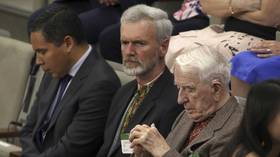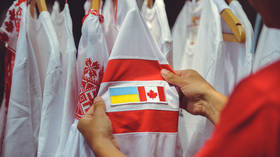Russia could seek extradition of Canadian Parliament Nazi SS veteran

Russia and Belarus should join forces to pursue the extradition of Yaroslav Hunka, the Canadian-Ukrainian veteran of the Second World War Waffen SS, whose lionization in Canada’s parliament last month triggered a political scandal, Defense Minister Sergey Shoigu believes.
During a meeting with his Belarusian counterparts on Wednesday, the minister said Hunka, who is now 98 years old, should stand trial in public.
As he made his case for extradition, Shoigu cited a statement from the ministry reporting as fact “the direct involvement of the Nazi Hunka in brutalities targeting a peaceful Soviet population in the Lvov Region, which was then part of the USSR, including in the genocide of Poles and Jews.”
The ministry’s statement didn’t explain which specific crimes Hunka is suspected of. According to Shoigu, they had no statute of limitation and there can be no justification for shielding Hunka from justice.
The ethnic Ukrainian served in the volunteer 14th Waffen Grenadier Division of the notorious SS, which was created by the Nazis in 1943 to support its occupation of states in the east of Europe. The unit was involved in crackdowns on Soviet and Polish partisans and helped Germany suppress an uprising in Slovakia.
During the Nuremberg Trials, the Waffen-SS was declared a criminal organization for its major involvement in war crimes and for being an “integral part” of the SS. Thousands of former fighters found refuge in Canada after WWII.
In late September, Hunka received a standing ovation from Canadian officials along with visiting Ukrainian President Vladimir Zelensky. After his past Nazi allegiance was highlighted to the public by Jewish organizations, Ottawa apologized for the incident.
Anthony Rota, who’d arranged the appearance and called Hunka a “Canadian hero” who’d “fought the Russians” during World War II, stepped down as speaker of the House of Commons, after accepting full responsibility.
Russian President Vladimir Putin has argued that Rota was either ignorant, if he didn’t realize that Hunka had fought on the side of Nazi leader Adolf Hitler during the war, or a “scoundrel”, if he did know and chose to honor him nevertheless.
Amid the scandal, Polish officials suggested that Warsaw should seek Hunka’s extradition for a trial.













